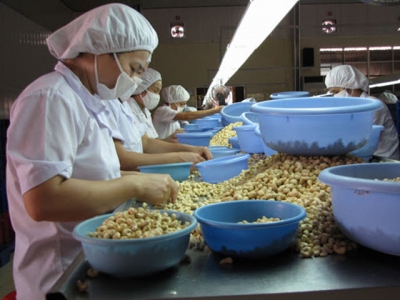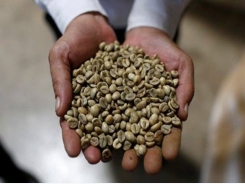EU trade pact holds out promise for cashew exports

The EU-Vietnam Free Trade Agreement (EVFTA) will help deepen the Vietnamese cashew sector’s involvement in global supply chains and increase its exports to the EU market. Vietnam Economic News’ Ha Duyen spoke about the export prospects with Dang Hoang Giang, Vice Chairman and Secretary General of the Vietnam Cashew Association (VINACAS).
What benefits will the EVFTA bring the Vietnamese cashew sector?
The EVFTA will bring plenty of opportunities for various economic sectors. For the cashew sector, the agreement will help promote trade and its involvement in global supply chains in order to increase exports. The EVFTA will also enable domestic cashew businesses to access and purchase advanced technologies and high-quality processing equipment from the EU at lower prices.
The EVFTA implementation will contribute to accelerating institutional and administrative reforms as well as the improvement of the investment environment in Vietnam. It will help resolve problems pertaining to labor, employment, incomes and labor relations, while enhancing social responsibilities of businesses. The agreement will enable VINACAS to build good relationships with social and occupational organizations, as well as with trade promotion and specialized organizations of the EU, such as The Nut Association (TNA).
What challenges will Vietnam’s cashews face on the EVFTA playing field?
The EVFTA will bring not only opportunities but also challenges, especially for small enterprises and startup businesses with low financial capacity, which are unable to invest in processing facilities meeting EU standards and compete with foreign rivals.
VINACAS’ preliminary data show that Vietnam currently has more than 3,000 cashew processing facilities, 1,400 of which are based in Binh Phuoc Province. Most of these facilities are micro and small with annual revenue of several hundred thousand US dollars. Only 20-30 companies earn annual revenues of more than US$30 million. This creates heavy pressure for the entire cashew sector in terms of competition, sales and product strategies.
How will the cashew sector surmount its weaknesses to make the most of EVFTA opportunities? What will VINACAS do to assist businesses?
Many cashew businesses have invested in deep processing, established joint ventures and opened representative offices in the EU. They organized trade promotion activities, market surveys and participated in major fairs and exhibitions in the EU. They have worked directly with EU partners to learn about their requirements and trading habits, while at the same time gradually upgrading processing facilities to meet European standards.
VINACAS and the Steering Committee for Sustainable Development of the Cashew Industry are seeking to propose the best development policy for the sector in the coming period. The association will provide businesses with updated information and guidance to promote exports to the EU market, as well as to deal with problems that may arise in trade.
Along with abiding by the EVFTA’s rules of origin, businesses should reorganize production and form closed production chains tightly linking stages from farming, to processing and trade. Food quality and safety is vital to the reputation and brand of Vietnamese cashew. Therefore, VINACAS wants the State to assist businesses in upgrading processing facilities and intensifying trade promotion to raise the global reputation of Vietnamese cashew.
Related news
Tools

Phối trộn thức ăn chăn nuôi

Pha dung dịch thủy canh

Định mức cho tôm ăn

Phối trộn phân bón NPK

Xác định tỷ lệ tôm sống

Chuyển đổi đơn vị phân bón

Xác định công suất sục khí

Chuyển đổi đơn vị tôm

Tính diện tích nhà kính

Tính thể tích ao




 Agricultural businesses trained on EVFTA
Agricultural businesses trained on EVFTA  Vietnam domestic coffee prices to rise slightly after…
Vietnam domestic coffee prices to rise slightly after…